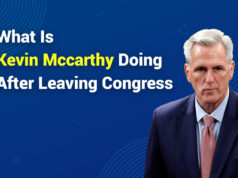Why are political parties essential to democratic government? Simply put, they are the cornerstone of the democratic process.
Almost all countries have political parties, but have you ever wondered why they are so important? If you live in a democratic government, you have political parties to thank for the freedom and rights you enjoy.
These parties serve as a platform for citizens to voice their opinions, elect representatives, and participate in decision-making.
They provide a structure for organized political competition, ensuring that different perspectives and ideologies are represented and debated.
Still interested in the topic? Let’s now discuss in detail why political parties are essential to democratic government.
What Is A Political Party?
A political party is an organized group of individuals with shared political goals and ideologies seeking influence over government policies and decisions through democratic means.
Typically, parties endorse candidates for elections, aiming to secure positions within legislative bodies.
These organizations are pivotal in shaping public opinion, advocating for specific policies, and representing diverse societal interests.
A political party typically has a formal structure, with leaders, members, and supporters all working towards achieving shared objectives.
Through their activities, parties help to create a sense of cohesion and unity among citizens with similar political leanings.
Why Are Political Parties Essential To Democratic Government?
Now that you already know what a political party is let’s look at the roles they play in a democratic government.
- Bring together the diverse interests and policies of various groups
Healthy political parties play a crucial role in aggregating the diverse interests and policies of various groups within society.
They serve as a platform for bringing together different perspectives and ideas, ultimately contributing to developing consistent and coherent policy agendas.
By fostering collaboration and consensus-building, parties ensure that the voices of all stakeholders are heard and considered in the decision-making process.
This inclusive approach not only strengthens democracy but also promotes effective governance based on the principles of fairness, transparency, and accountability.
- Educate citizens about politics and policies (and the consequences)
Healthy political parties serve as platforms to educate voters on the impacts of different policies, helping them make informed decisions during elections.
Furthermore, these parties act as a check and balance system, holding the government accountable for their actions and policies when they are not in power.
Fulfilling these functions, political parties contribute to a well-functioning democracy and ensure that policies are transparent, understood by the public, and aligned with the needs of society.
- They allow citizens to participate in the political process and exercise their right to vote
Political parties are like teams in the political arena. They give regular people a way to be part of the game, allowing them to have a say by supporting a party that aligns with their beliefs. It’s the stage where citizens, like actors, participate in the governance through their votes.
- They create a sense of identity and belonging
Political parties bring together individuals with similar political ideologies, creating a sense of identity and belonging.
This fosters a community where people feel connected to a larger group that shares their values and goals, strengthening their commitment to common political objectives.
- Political parties facilitate the peaceful transfer of power
In a democratic system, political parties facilitate the peaceful power transfer through elections.
When voters choose a new party or candidate, it signifies a peaceful change in government leadership. This ensures stability and continuity in governance without resorting to violent or undemocratic means.
- They keep the ruling party in check
Opposition parties play a vital role in upholding democratic principles by closely examining the actions and policies of the ruling party.
Through their scrutiny, they help to ensure that those in power are held accountable for their decisions and prevent any potential abuse of authority.
This system of checks and balances promotes transparency and responsiveness and ultimately helps to maintain a healthy democracy.
- Shape public opinion and influence policy.
By utilizing various strategies such as campaigns, media interactions, and public outreach programs, parties aim to sway public perception in their favor.
Moreover, once they assume power, these parties implement policies that align with their ideological positions and cater to their supporters’ preferences.
- They foster political stability and social cohesion
Political parties contribute to stability by providing a structured framework for governance. Through their organizational structures and established processes, parties help prevent political chaos.
Moreover, parties contribute to social cohesion by representing diverse interests and fostering unity despite ideological differences.
- It’s a platform for political activism and advocacy
Political parties offer individuals a platform for activism and advocating for change.
Party members can voice their concerns, contribute to policy development, and actively participate in the democratic process, ensuring diverse voices are heard within the political landscape.
- Promotion of democratic values
Political parties actively contribute to the promotion of democratic values by upholding fundamental principles within their organizational structure.
A cornerstone of this commitment is safeguarding freedom of speech and expression among party members. By encouraging an environment that values diverse opinions and open dialogue, parties cultivate a democratic ethos internally.
This commitment not only strengthens the party’s democratic foundations but also sets an example for the broader society.
Through these values, parties demonstrate a dedication to inclusivity, pluralism, and the protection of individual rights, thereby advancing the core tenets of democracy within the political sphere and beyond.
What Are the Consequences of a Weak Political Party in A Democratic Government?
A weak political party can harm the functioning of a democratic government.
Now that you know how important healthy political parties are in a democratic government, let’s explore the consequences of having weak political parties.
1. Weak political parties face significant challenges in fulfilling their role as effective gatekeepers within the political process.
This hampers their ability to screen and select candidates carefully and opens the door for less qualified or extreme individuals to gain entry into mainstream politics.
As a result, the overall quality and integrity of the political landscape may be compromised.
2. Weak political parties, with their limited ability to cater to the diverse needs of voters, often struggle to address citizens’ concerns and provide responsive representation effectively. This can lead to a lack of policy formulation and implementation, further exacerbating the challenges these parties face.
As a result, voters may feel disillusioned and unheard, causing a disconnect between the political leadership and the people they are meant to serve.
3. A decline in the perceived effectiveness of political parties can lead to a surge in independent voters who feel disconnected from the traditional party structures.
Discouraged by the lack of progress and accountability within parties, these voters may prioritize addressing issues like corruption and transparency over traditional policy concerns. This shifting focus challenges the established dynamics of political parties.
4. Weaker parties may struggle to maintain ideological cohesion and unity among their members, especially during critical times such as election campaigns or policy debates.
These internal divisions hinder effective decision-making and make it challenging for the party to present a clear and unified stance on important issues to the public.
5. While weakened parties may struggle to maintain their traditional gatekeeping functions, strong partisanship and the influence of money ensure that their impact persists.
Julia Azari observed that this combination often leads to a highly volatile political environment where parties may be weak, yet partisanship remains fervent.
In such a landscape, the power struggles between different factions within parties and the relentless pursuit of financial backing can further exacerbate the intensity of political rivalries.
6. As parties become less effective in representing citizens and responding to their needs, there is a risk of increased public distrust in the democratic process. Citizens may question the value of democracy itself when parties fail to fulfill their essential functions.
However, it is important to note that this crisis of faith in political parties does not necessarily equate to rejecting democracy as a whole.
Instead, it highlights the need for parties to adapt and evolve to regain the electorate’s trust.
7. Weak political parties risk democracy, potentially paving the way for authoritarianism. They lack the institutional strength to check executive power, allowing leaders to consolidate authority without scrutiny. Internal democratic deficits within weak parties enable the emergence of leaders without broad support or accountability, fostering an environment conducive to authoritarian rule.
Additionally, such parties may fail to control extremist elements, leading to the rise of anti-democratic ideologies. Fragmentation and instability within weak parties can also create political vacuums exploited by leaders promising stability.
Conclusion
Why are political parties essential to democratic government? Political parties provide a platform for citizens to express their political views and participate in decision-making.
They serve as a link between the government and the people, ensuring that the voices of the electorate are heard and represented.
They help to organize and mobilize voters, promoting active civic engagement and encouraging citizens to exercise their right to vote.
Furthermore, political parties offer a mechanism for holding elected officials accountable for their actions, providing an avenue for opposition and scrutiny.
Without political parties, the democratic system would lack structure and cohesion, making it difficult to effectively govern and represent the diverse interests and opinions of the population.














